Life of Pi – Review
December 19, 2012 4 Comments
Life of Pi (2012) 
Director: Ang Lee. Cast: Suraj Sharma, Irrfan Khan, Ayush Tandon, Gautam Belur, Rafe Spall, Gérard Depardieu
Having read the original book several years ago (in fact, to be precise, I remember listening to its unabridged audiobook version) when I learnt that a movie adaptation was going to be made, my instant (and rather predictable) reaction was “How on earth are they going to pull that off?”. If you, like me, have read the Pulitzer Prize winning story, you’ll understanding my doubts and share my initial skepticism: it wasn’t just the way it was written, through a continuous series of sketchy flashbacks and very internal (and sometimes rather abstract) dialogues, but mainly because, for the greater part, it featured a boy and a tiger stuck on a raft in the middle of the sea.
But as you can tell from my 8 and 1/2 star rating at the top of this review, the answer is right there on the screen: they did pull it off! In fact I liked the film so much that it’s become one of my favourite of the year and possibly my best bet for the forthcoming Oscars.
Yes, of course there were a few annoying little things here and there which prevented it from being a true masterpiece, but whist these things in any other film would have caused me to hate it, in Life of Pi the good stuff is actually SO GOOD that I am willing to forgive any other possible weakness.
Let’s start from the beginning, in fact from the very-long-beginning: yes, the film does take its time to get started and even though the first 30/40 minutes are still perfectly watchable, entertaining, charming and beautifully shot, I couldn’t help feeling that it was all a bit too loose in. The film heavily relies on voice over joining a series of slightly patchy sequences, alternating each other as the several subplots unravel (including a rather redundant – at least in the movie – love story). Interestingly the character of the cook played by Gerard Depardieu, who should have been more developed, is reduced a nothing more than a little 2-dimentional caricature…
Let’s face it, Life of Pi really starts with the sinking of the ship, which happens about 40 minutes into the film. I wonder how many people in telling their friends what the film is about, will actually mention anything that happens before this sequence.
Now I must confess, after James Cameron‘s Titanic I never thought I would ever be amazed at the sight of any ship sinking in any movie. Well, I was obviously wrong!
This scene is absolutely gripping, beautifully executed and visually stunning: in fact generally speaking the film is a constant feast for the eye throughout, but it’s from the moment Pi Patel finds himself shipwrecked that the real magic begins! Yes, Magical is the only word that comes to mind in describing the film. A succession of one amazing sequence after another showcasing some of the most advanced special effect ever seen. The cinematography is a true work of wonder with its striking palette of colours, its magical painterly feel and of course the most astonishing CGI work seen since Avatar, which makes the crouching tiger in the film (sorry, I couldn’t resist the pun) not just a real visual wonder but a totally convincing character. So much so that I wasn’t even sure it was actually computer-generated until I saw a documentary afterwards.
The use of the 3D technology is also some of the best I’ve ever seen, in fact possibly THE best 3D of any movie I’ve seen. It’s clear that director Ang Lee and his cinematographer Claudio Miranda really understand how to use this new technology and have great fun not just at playing with it (changing the aspect ratio of the screen and throwing things at the audience), but also using that extra 3rd dimension to add something to the story: the sequence taking the audience into Pi’s diary is just one of the many beautiful examples of how 3D is used to add a feel that normal 2D wouldn’t be able to convey.
As you’re watching Pi’s adventures, his struggle to survive and his relationship with the tiger, you know you are watching an instant classic. This is one of those films which will work on different people in many different ways: kids will get something out of it, adults something different, religious people will find enlightenment, non-believers will still find quite a lot to enjoy (However be prepared if you’re taking your kid along for some fairly strong scenes involving animals eating each others). I’m sure in years to come people will still watch this movie.
The core of the film is framed by a “let-me-tell-you-a-story” type of device, in which an older Pi recounts his memories to a writer. This is probably the clunkiest part of the film and ultimately it’s what lets it down. For a start knowing that Pi has survived his odyssey works slightly against the tension the film is trying to build throughout the perilous journey: it’s as if Cast Away had started from the end. It also spells out aloud the message of the film killing all those subtleties from the book (the worst offender is a scene towards the end where the true nature of the journey is revealed through some nasty explanatory dialogue). It’s really nothing to do with the actors playing older Pi and the writer: Irrfan Khan is as always impeccable and brings a gravitas and sweetness to the part (reminiscent of his wonderful character in the stellar third season of “In Treatment”). The writer himself is a bit of a bland character, a proof of the fact that he’s a functional character and nothing more than that: he’s supposed to bring nothing to the table aside from asking the right questions, tell us the meaning of what we’ve just heard and give a reason to older Pi to tell his story. It’s interesting to know that Toby Maguire had been cast for this part and was later replaced because he was allegedly stealing the scene.
When the twist finally comes at the end, it is delivered by an astonishing Suraj Sharma (a kid with no acting experience who would truly deserve an Oscar): it is spectacularly moving monologue that leaves the audience slightly bewildered, possibly disappointed at first but with hindsight, looking back at it, there is no denying, it is a powerful story, beautifully gratifying, meaningful and profound… and of course an incredible technical achievement.
I can’t wait for my kid to grow up a bit so that one day I could show it to him.
8.5/10









